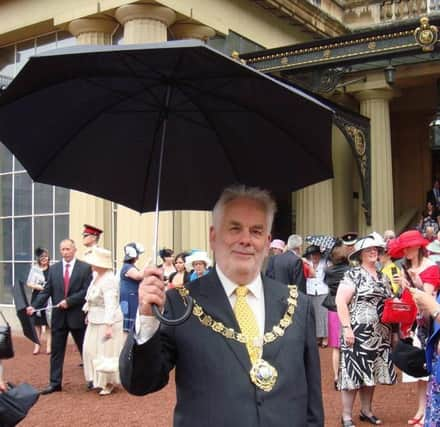Date announced for service for ‘much loved’ former Chichester Mayor


In 2005 he was elected as Councillor to the Chichester City Council and later to the West Sussex District Council for several years, as well as Mayor of Chichester from 2009 to 2011. He was the Chairman of the
Advertisement
Hide AdAdvertisement
Hide AdCity Planning Committee and for some years the Treasurer of AVID (the national Association of Visitors to Immigration Detainees).
Around the year 2000 Michael joined the Portsmouth based refugee organisation Haslar Visitor’s Group which later became Friends Without Borders.
When he became chairman of the charity, Michael worked tirelessly to improve the conditions of refugees and asylum seekers in the UK.
His endless energy, his remarkably optimistic outlook in life, and his light and affable personality managed to attract the sympathy of many across all sectors of society: the general public, academics, politicians and religious figures through a practically non-stop tour of talks and conferences around the country which raised hundreds of thousands of pounds for the charity.
Advertisement
Hide AdAdvertisement
Hide AdThough a quiet personality and always looking for consensus, he was nevertheless a powerful force when focused on helping people in need.
Michael was a Quaker. He often talked about how their egalitarianism and commitment to human rights particularly appealed to him.
As did their lightly defined spirituality and emphasis on practical action. He worked continuously so human rights were not forgotten for people that came to the UK looking for safety.
He also helped the local community of Chichester. He founded the Chichester Welfare Trust and was its Chairman for several years.
Advertisement
Hide AdAdvertisement
Hide AdThis Trust helps local Cicestrians whose needs sometimes are overlooked by the welfare state.
Michael was born in 1944 and often said he had a happy childhood in Leeds.
He moved to Chichester in 1965 to train as a teacher at Bishop Otter College.
After finishing his studies there, he worked as a teacher for some years in Chichester.
Advertisement
Hide AdAdvertisement
Hide AdAround this time, an acquaintance had an immigration problem and Michael wrote to his MP.
This was his first encounter with the over-complex inner workings of the Home Office.
In due course a letter came back from the Home Secretary himself.
The 1971 Immigration Act had only just been passed and there were fewer immigration cases to concern Home Secretaries in those days.
Advertisement
Hide AdAdvertisement
Hide AdIn 1971 Michael received and invitation to work for a shipyard in Seville, teaching English to the managers. Franco, the last of the right-wing European dictators of the thirties, was in power.
While there, Michael witnessed first-hand some of the brutalities of the regime.
It was an eye-opening and painful experience, leaving him with an enduring sympathy for the downtrodden.
Returning to England in the Eighties, he initiated a new career, buying big old houses in the East End of London and converting them, partly by his own hand, into flats.
Advertisement
Hide AdAdvertisement
Hide AdThe Thatcher years were kind and he made a comfortable living. At the end of the decade however, the economic climate changed in Britain and Michael found himself having to look elsewhere.
He moved to Mexico where he got a job as the English adviser to one of the largest banks, a sinecure but well paid: a bit of teaching, a bit of translation.
Just as life was getting better again, in 1995 the political turbulence made the Mexican economy crash with 116 per cent inflation.
With this, the Mexican job and the Mexican adventure came to an end.
Advertisement
Hide AdAdvertisement
Hide AdMichael returned to Chichester where he had a flat since 1968.
It was around then that Michael heard for the second time about the problems of immigration detainees in the UK.
He was outraged to learn that they could be held indefinitely in UK prisons without a court hearing, without habeas corpus.
His early encounter with the Home Office, his experiences living in foreign countries, his commitment to Quaker values and respect for human rights came together at this point.
Advertisement
Hide AdAdvertisement
Hide AdHis work was often met by unsympathetic bureaucrats and sometimes disengaged public. But he worked to make sure that the bureaucracy did not forget the humanity of the people seeking asylum.
At times he realised that it was only the charity’s support which stopped an asylum seeker ending up destitute.
In his role as Mayor of Chichester, Michael immersed himself enthusiastically in the city’s life, from visiting local schools and the university to meeting local business men and women, getting involved in anything he could to support the local life.
Michael Woolley researched and wrote the booklet “The Quakers in Chichester” and for twenty years led the “Quaker Walks” around the city.
Advertisement
Hide AdAdvertisement
Hide AdTowards the end of his life, Michael himself commented that his life was in some ways “a rickety one but interesting.”
His legacy lays in the large number of people he helped and whose lives’ paths he shared; and who will never forget they met him.
There will be a public service at the Chichester Cathedral to celebrate Michael Woolley’s life on May 13 at 12:00 midday. Followed by a reception at Chichester City Council Rooms at 13:30 pm.
Attenders must RSVP by emailing [email protected] by April 30.